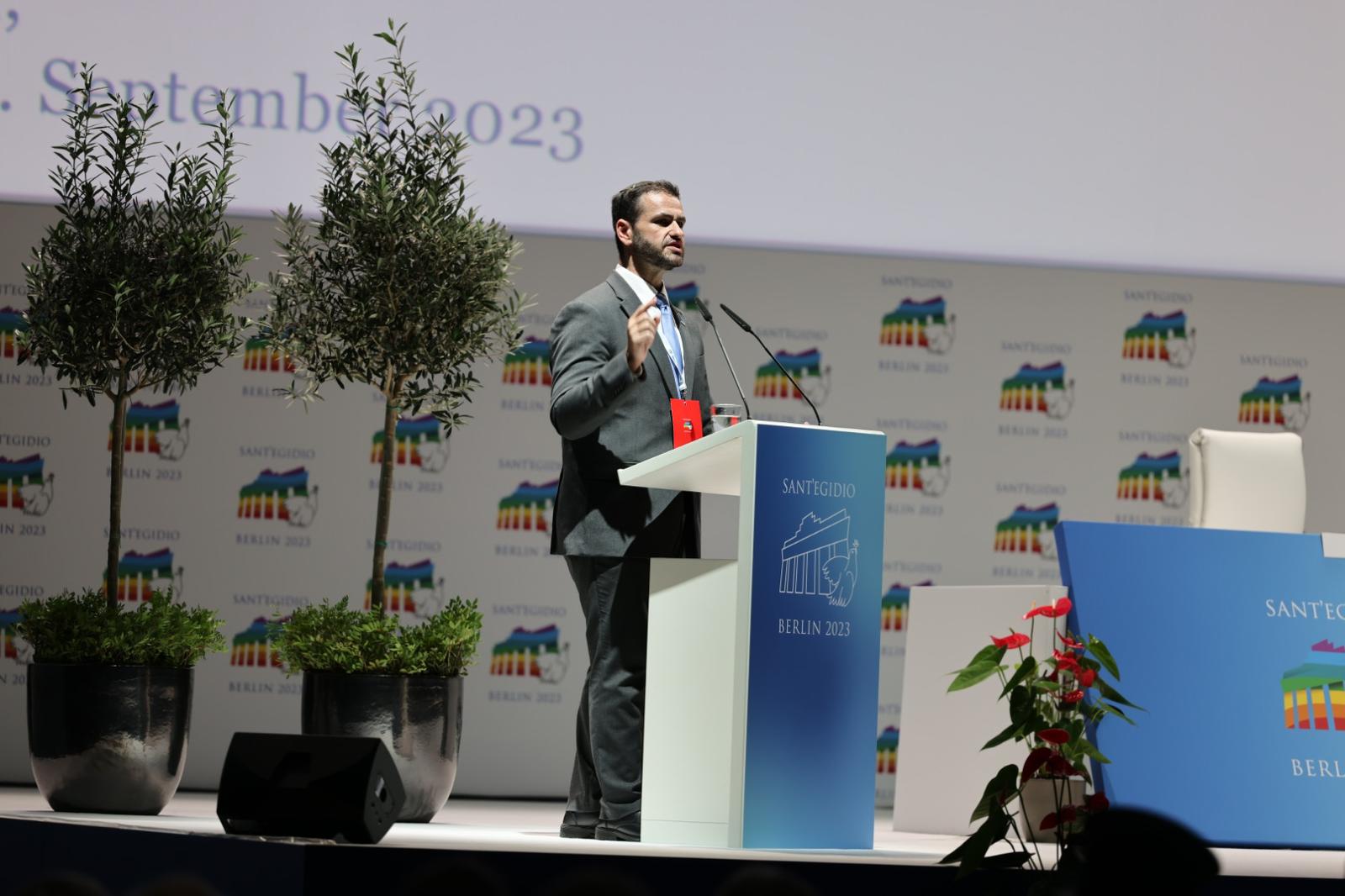
K’vod Harabbanim,
President Steinmeier,
Mr. Riccardi,
Grand Imam Al-Tayyeb
President Sissoco Embaló,
Ms. Zarabi,
Mr. Pillay,
Ms. Kurschus,
Bishop Bätzing,
distinguished guests,
My name is Zsolt Balla, and as a board member of the Orthodox Rabbinical Conference Germany, I have the honor to address you today in the name of Chief Rabbi Pinchas Goldschmidt, the president of the Conference of European Rabbis. It is a true privilege to join the prestigious Sant’Egidio community and joining hands to discuss the audacity of peace.
The Babylonian Talmud says, if one sees a dream, and in the dream appears one of three things, he can anticipate peace. These three things are: a river, a pot, and a bird. The obvious question is, what do these three things have to do with peace?
The rabbis explain that the statement of the Talmud is of course a metaphorical one. The river, the pot, and the bird, all represent a different level of peace.
The river, which by definition is a divide between its two sides, nevertheless allows communication, and even exchange. One can build bridges or use a ship to connect the two sides. But they will always exist as separate entities. This coexistence can allow to each of the sides to advance, but will not unlock the capacities, which would enable them to reach even higher. The two sides of the river remain strangers to each other. Mankind has experienced many times, how a fear of a stranger can bring hatred, aggression, and destruction. The peace represented by a river is an unstable one.
The pot represents a higher level of peace. There are two conflicting elements, which cannot exist together: fire and water. Water extinguishes the fire, but without the fire it could never become hot. Placing a pot in between however achieves a cooperation between the fire and the water. This represents the level of peace, when two conflicting sides understand that they need certain measurements and regulations to work together for a higher purpose, but without getting hurt. Just as a pot achieves this, so too it is possible to strive together for a common goal.
But there is a limitation. When the common goal is achieved, the pot loses its necessity. There is a danger to return to the lower level of peace, represented by a river.
The bird symbolizes the ultimate goal of peace. Birds unite in their existence two things that can never really come together: heaven and earth. In the late 90s a crew of documentary film makers followed migratory birds. After many weeks the crew, who literally flew thousands of kilometers together with the birds, said that after a time they realized, it wasn’t them observing the birds. It was the birds observing us. Complete harmony, heaven and earth unite.
And this is the level we must strive for. The understanding that we cannot exist without each other. All humanity is dependent on one another. This is expressed by the etymological analysis of the Hebrew word for peace, “Shalom”. Shalom originates in the word “Shalem”, “complete”. And so the absolutely correct translation of “Shalom” is not “peace”, but “complete harmonious unity”. “Shalom” is achieved when all of us acknowledge that we are but small cogs in an enormous machine. Yes, the machine is huge, but it does not function as long as all the cogs are in place and turn the way they are supposed to.
This coming weekend in the synagogues all over the world Rosh Hashana will be celebrated, which is mistakenly known as the “Jewish New Year”. The day commemorates the Creation of the World and mankind. So, it’s really the world’s new year, but only Jews know it. In the synagogues the brutal tone of the shofar, the ram’s horn is sounded, calling us to repent to the Creator of the World.
The great medieval Jewish philosopher, Rabbi Moshe ben Maimon, known as Maimonides, writes that in order to repent, we need to consider ourselves as someone in the middle, both as individuals and as mankind, whose merits and sins are equal, and every deed, good or bad, could tip the balance, for the good and for the bad. Really, every tiny deed? My teacher and mentor, Rabbi Rappoport of Jerusalem, analyzing the statement of Maimonides, says that with our current knowledge of mathematics, Maimonides would have described this phenomenon with chaos theory, or as you might have heard of it, the butterfly-effect. It means that we all can actually influence the world. Yes, just as butterfly’s move can under certain circumstances could lead to a hurricane thousands of miles away, so to our small deeds could grow into enormous events. We matter.
We have the privilege to sit in this hall together with many excellent leaders and individuals, and it is clear to me that you are here, because you recognize, yes, our deeds matter, and yes, we want to tip the balance towards the good. I do not have the audacity to tell you, how you should do this. But with the words of the great late Lord Rabbi Jonathan Sacks of blessed memory: “Good leaders create followers, but great leaders create leaders.”
It is our duty to take this message of peace, or as the Hebrew word “Shalom” indicates, complete harmonious unity. May our endeavors be for the sake of Heaven, and may the Almighty send his blessing and his peace upon us!
